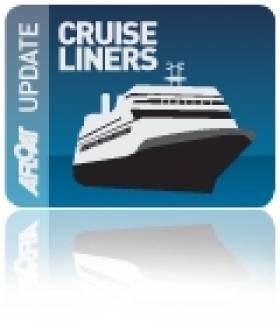Displaying items by tag: Point Village
Dublin Port Outlines Plans for First Dedicated Cruise Terminal
In order to facilitate this growth, the draft proposes switching existing berths used by large cruiseships away from unattractive cargo-docks in Alexandra Basin's West and East and at Ocean Pier. Up to three alternative locations were examined and the port agreed that the option identified in the Dublin City Council's Area Plan of the North Quay Extension is the optimum location.
Before any such development, it would require relocating an existing roll-on roll-off terminal (No.3), which is currently in use by P&O Irish Sea for their Dublin-Liverpool service. The company operate three sailings daily on the central corridor route.
The new facility could accommodate two large cruise ships simultaneously and would be much larger than the 43,524grt The World, the luxury resort vessel operated by Residensea, which docked at the North Wall Extension in 2010 (for report click HERE).
The location is on the doorstep to the East-Link Bridge and the neighbouring O2 Arena and Point Village developed by Harry Crosbie, who called for the relocation of cruise callers to be sited upriver.
According to the draft, the closer proximity to the city-centre would provide a stronger presence and a more accessible link with the city. It would also avoid the unnecessary longer bus transfers between cruise berths and visitor attractions in the city-centre and locations in counties Wicklow and Meath.
Construction of facilities for a cruise terminal would expensive as it will involve new quay walls capable of accepting large cruise vessels but this could only be done after dredging the channel to a depth of 10.5m.
The facilities of the terminal are to incorporate a reception, tourist information and interpretive centre, a dedicated entrance for pedestrians, coaches, vehicles and traffic management measures would be implemented.
In addition the site would also require the expensive exercise in re-locating ESB underwater high-voltage cables. The initial costs suggest to develop new terminal facilities and associated works would be in the region of €30m.
Dublin Port Company, state that due to the relatively low revenues generated by cruise ships, such an investment alone could not be justified, however, they could part-fund the development but additional funding would be required from other sources.
- Dublin Port
- Dublin Port Company
- The World
- Cruise Liners
- Harry Crosbie
- Port of Dublin
- Ports and Shipping News
- Point Village
- P&O (Irish Sea)
- Cruise Liner news
- Ocean Pier Dublin Port
- O2 Arena
- EastLink bridge
- Dublin Port draft masterplan
- DPC
- North Wall Quay Extension
- Residensea
- Dublin Port Terminal 3
- Alexandra Basin Dublin
Dublin Hosts Maritime Law Seminar Next Month
The latest Maritime Law Seminar hosted by the Irish Maritme Law Association (IMLA) will take place on Thursday 12 May 2011 in The Gibson Hotel at The Point Village in Dublin's Docklands.
Also open to non-members, the day will feature discussions on the areas of ship arrests, sale of goods, marine casualties and maritime jurisdiction.
The seminar fee is €100 for IMLA members (€130 for non-members) and bookings mist be made with payment by Tuesday 10 May.
A booking form with further details is available from the IMLA website.
Vacancy at Seatruck Ferries
Seatruck Ferries, the only Irish Sea ferry company, dedicated solely to the carriage of freight, are looking to appoint a Group Operations Manager. The position is based in their Heysham office in Cumbria. In addition the appointment would require regular travel to Seatruck's other terminals on both sides of the north Irish Sea.
The company operates the Dublin-Liverpool, Warrenpoint-Heysham and Heysham-Larne routes which are served by an eight-strong fleet. In recent years four Spanish built newbuilds were commissioned into service on the Dublin-Liverpool and Warrenpoint-Heysham routes. Each newbuild has a 120 freight unit capacity.The remaining four vessels where built in 1998 and they can each handle 65 freight units.
Seatruck's Dublin Port operations is located at the Alexandra Basin terminal close to the East-Link Toll-Lift Bridge and the Point Village.
To find out more about the vacancy (including PDF) logon HERE and in general about the company click www.seatruckferries.com The closing date for applications is 31 January.






























































